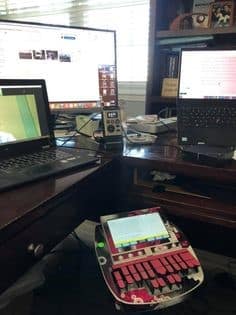An Inside Look at a
Court Reporter’s
Remote Deposition Setup

When the COVID-19 pandemic first forced workplace closures back in March of 2020, people across the country, and even the world, quickly found themselves working from their home office, dining room, table, couch and other unique locations within their homes – nearly anywhere they could find a quiet place. The legal industry, including professional court reporters, was certainly not immune to the work-from-home trend.
Court reporters shifted to working remotely nearly overnight and had to re-engineer how they operate in their day-to-day life reporting depositions and other proceedings. The emergence of new remote platforms, guidelines and client expectations led court reporters to quickly adapt to ensure business as usual to capture the record.
At the onset of the pandemic, remote work for many meant simply setting up a workspace at the kitchen table or in the living room. Now a year later, with some creativity, coupled with trial and error, many court reporters have learned the helpful “do’s and don’ts” for at-home remote deposition setups.
We recently asked a few professional court reporters to share their remote deposition “offices.” Take an inside look at their setups below.



For additional insight into how court reporters transitioned to remote environments, check out a court reporter’s guide to remote depositions on our blog.
As the pandemic continues and the acceptance of remote formats for proceedings continues to gain widespread adoption, it is important to stay up-to-date on best practices and considerations for a successful remote deposition. Check out some remote deposition tips from top litigators here.
In preparation for upcoming and future remote depositions, we gathered equipment and accessory recommendations that make the process easier for both you and your clients. Download our remote deposition witness kit here.
Editoral Policy
Content published on the U.S. Legal Support blog is reviewed by professionals in the legal and litigation support services field to help ensure accurate information. The information provided in this blog is for informational purposes only and should not be construed as legal advice for attorneys or clients.


